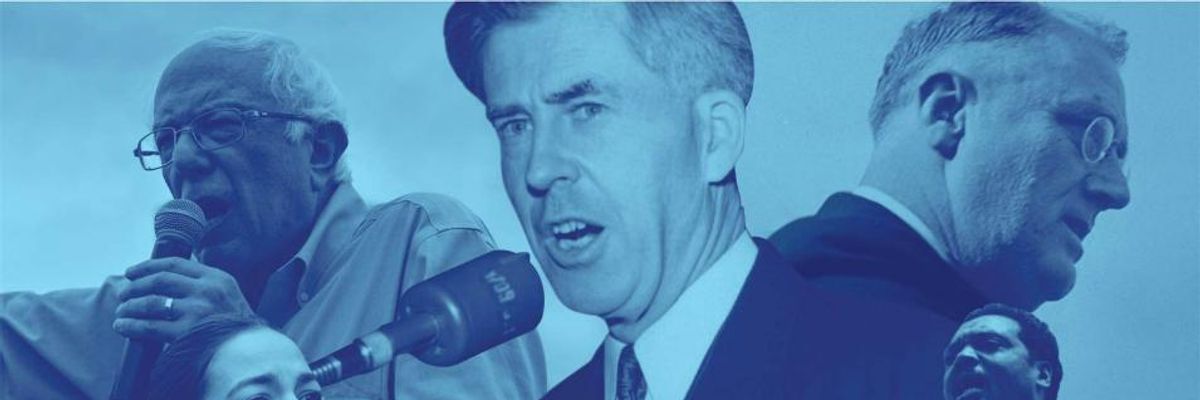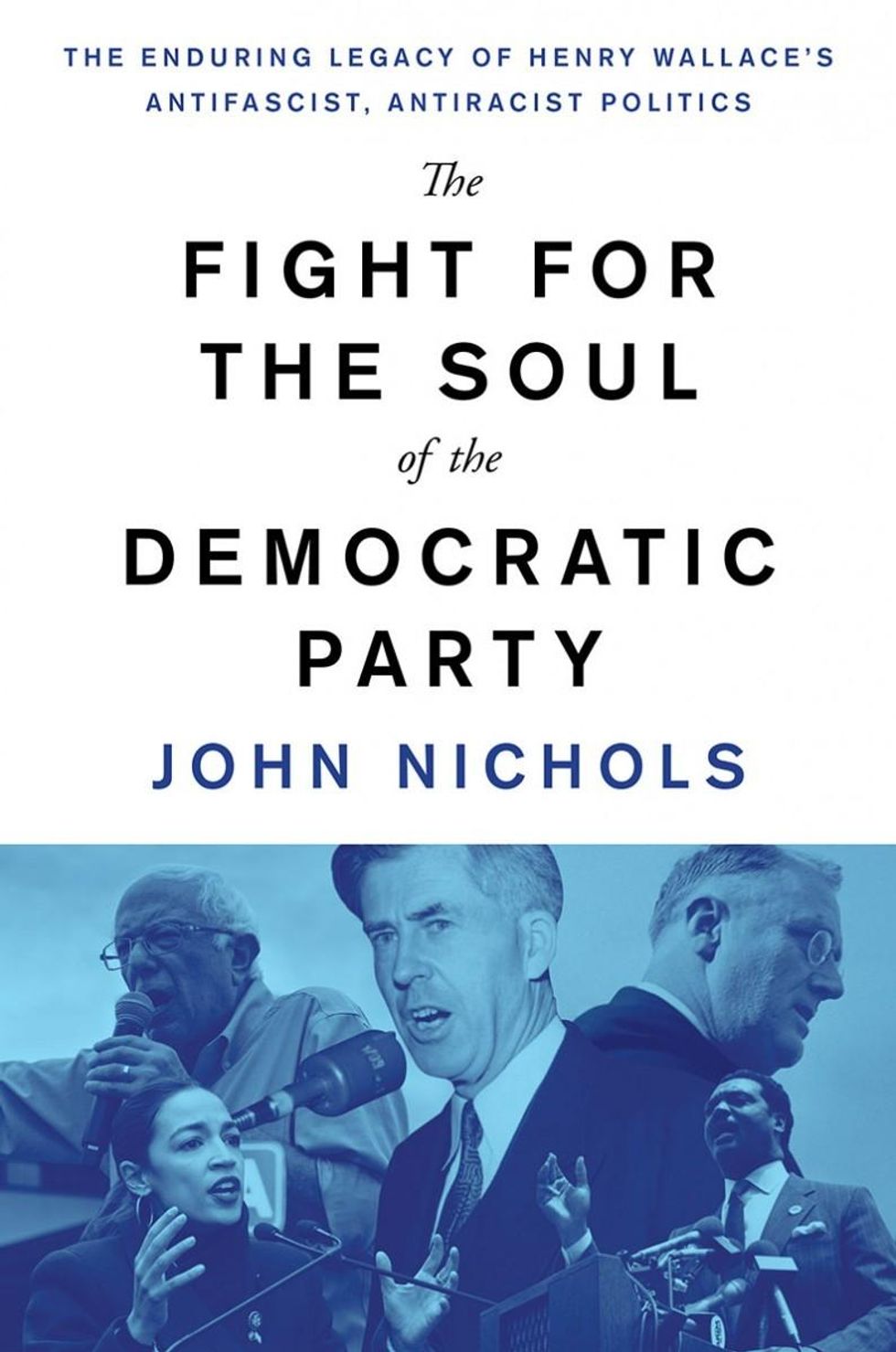Instigated by the 2016 election debacle that Hillary Clinton and the Democrats "should have won by a landslide," John Nichols' new book, The Fight for the Soul of the Democratic Party: The Enduring Legacy of Henry Wallace's Antifascist, Antiracist Politics, asks a couple of questions that have haunted many of us:
Whatever happened to the liberal, social-and-industrial-Democratic party that FDR built in the course of leading Americans against the Great Depression and Fascism? And can progressives yet redeem it? His answers are timely and challenging--though presumably, given the outcome of the 2020 primaries, not the way he had hoped.
As his new book, attests, Nichols, national correspondent of The Nation magazine and author of many provocative works on American history, politics, and media, knows progressive politics past and present, inside and out. And in the interest of full disclosure, I should make it clear that John and I--fellow Wisconsinites--have been friends for years. We share an admiration for both Roosevelt and Thomas Paine, and he graciously praises my work in this new book. With that explained, I write this not for comradely but for historical and political reasons.
Whether my friend intended it or not, this deftly told history compels us to recognize that the repeated progressive failure to prevail in the now 75-year-long-struggle to take back the Democratic Party is owed not merely to the strength of the opposition, but also in good part to tragic decisions made, ironically enough, by our own champions Franklin Roosevelt, Henry Wallace, and Bernie Sanders.
Nichols' telling of the Democratic Party's declension from FDR-liberalism to neoliberalism begins neither in the 1970s with Jimmy Carter's presidency, nor in the tumultuous 1960s with LBJ's decision to prioritize the war in Southeast Asia over the War on Poverty in America (both of which he addresses). Rather, Nichols takes us back to Roosevelt's surprising and fateful decision to bow to the demands of conservative-pro-business and reactionary-Southern Democratic Party elites that he place the centrist Senator Harry Truman on the 1944 presidential ticket instead of his outspokenly progressive wartime vice president Henry Wallace--outspoken to the point of unabashedly calling out anti-labor corporate bosses and pro-segregationist politicians as "fascists."
Recognizing the President's deteriorating health, those conservatives and reactionaries did not want a President-in-Waiting who they feared would aggressively revive the New Deal and seriously try to bring an end to white supremacy in Dixie.
FDR's decision remains puzzling today. Roosevelt had firmly insisted on having his two-term New Deal Secretary of Agriculture Wallace on the 1940 presidential ticket. Wallace as vice president not only had ably overseen critical aspects of the war effort, but also enthusiastically promoted FDR's vision of the Four Freedoms: "Freedom of speech and worship, Freedom from want and fear."
In fact, encouraged by polls showing the great majority of Americans wanted to revive the New Deal and make the Four Freedoms all the more real at war's end, Roosevelt launched his campaign that January in his Annual Message to Congress. He proposed an Economic Bill of Rights for all Americans and that very October told the nation, "The right to vote must be open to our citizens irrespective of race, color, or creed--without tax or artificial restriction of any kind."
Moreover, we now know he was secretly exploring the possibility of joining with progressive Republicans (there were quite a few back then!) to turn the Democratic Party into a united liberal party purged of conservatives and reactionaries.
The decision to remove Wallace, as Nichols details, was fateful. On Roosevelt's passing in April 1945, Truman became president. Predictably, he was no FDR or Wallace. He brought hacks and cronies into the White House, drove New Dealers out of his administration (including the now Secretary of Commerce Wallace), mishandled the immediate transition from a wartime to peacetime economy, alienated both labor and liberals, and in 1946 essentially handed Congress to the Republicans, who quickly passed the Taft-Hartley Act and effectively forever after stymied labor organizing down South.
Yes, he proposed progressive legislation, but, with the GOP controlling Congress and able to count on southern Democratic votes in a pinch, he accomplished little of significance other than to bolster the Republicans' anti-New Deal "Red Scare" initiatives by subjecting all federal employees to a "loyalty review" and to lead the United States into a dangerous Cold War (which given Stalin's ambitions may have been unavoidable) and a hot war in Korea.
Nichols' primary protagonist Wallace himself made the next dreadful decision. Outraged by Truman's handling of both domestic and foreign policy, instead of fighting to win back the party in 1948, Wallace bolted from the Democrats to pursue a futile campaign as the presidential candidate of a new Progressive Party. Backed by left-led labor unions, militant liberals and progressives, and cohorts of American Communists, he campaigned courageously, even going down into the deep South to speak before racially integrated audiences.
"This deftly told history compels us to recognize that the repeated progressive failure to prevail in the now 75-year-long-struggle to take back the Democratic Party is owed not merely to the strength of the opposition, but also in good part to tragic decisions made, ironically enough, by our own champions Franklin Roosevelt, Henry Wallace, and Bernie Sanders."
It was not without consequence, for Truman may well only have beaten the Republican Thomas Dewey that year because Wallace compelled Truman to move left to avoid losing significant numbers of labor and liberal voters. But as Nichols makes painfully clear, Wallace himself didn't just lose, he lost miserably. It finished off his political career and cost the Democratic Party its most progressive voice. A generation was to pass before progressives would again become a force in the party.
For all that, Nichols cites reasons to feel hopeful, if not optimistic, that progressives can finally prevail in the fight for the party's soul. Pointing to both the 2018 congressional victories by Rep. Alexandria Ocasio-Cortez (AOC) and "the Squad" and the presidential candidacies of Senators Bernie Sanders and Elizabeth Warren, he sees a revival of the Democratic Party left. He even recounts a conversation he had with Sanders at Wallace's Iowa home in which Bernie signaled his determination if elected to pursue FDR's Four Freedoms and projected Economic Bill of Rights.
Which brings us to the third tragic decision.
Sanders was not to win the nomination. But to his credit, he once again did not, in contrast to Wallace, abandon the Democrats. And yet, he might actually have won the nomination had he not done what he also did in 2016. Despite his professed aspirations and his campaign website echoing FDR's New Deal (New Deal/Green New Deal; Social Security/Medicare for All; industrial democracy/workers democracy; Economic Bill of Rights/21C Economic Bill of Rights), he essentially turned his back on Roosevelt. He neither joined the Democratic Party, nor even ran as the FDR Democrat he clearly is.
Instead, he once again ran as a "democratic socialist" and wasted precious time trying to explain what that meant. Even worse, he never once mentioned FDR in the nationally televised primary debates to remind Americans of how President Roosevelt and the generation we revere beat the Great Depression and fascism by radically enhancing American democratic life. Nor did he chastise his neoliberal opponents for betraying FDR's and their grandparents' struggles, achievements, and the promise of the Four Freedoms. So Bernie lost, and we lost.
Nonetheless, Nichols' book gives us good reason to hope and to act. On entering Congress, AOC, the brightest and possibly most popular figure in the Democratic and progressive caucuses, linked herself to the tradition of FDR's politics and party. Indeed, she told Nichols, "I want us to be that party again!"
Meanwhile, we should not ignore or simply scoff at Joe Biden's statement that in view of the crises of Trump and the pandemic he plans to launch an FDR-style administration. We should push Joe on it, remember it, and hold him accountable to it.





